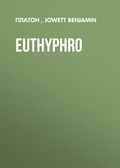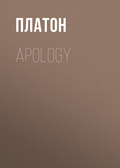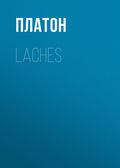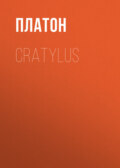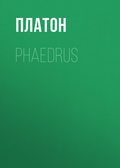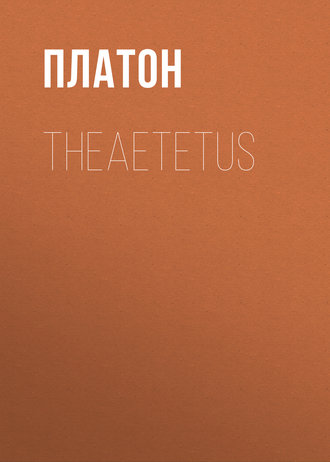
Платон
Theaetetus
d. Nearest the sense in the scale of the intellectual faculties is memory, which is a mode rather than a faculty of the mind, and accompanies all mental operations. There are two principal kinds of it, recollection and recognition, – recollection in which forgotten things are recalled or return to the mind, recognition in which the mind finds itself again among things once familiar. The simplest way in which we can represent the former to ourselves is by shutting our eyes and trying to recall in what we term the mind's eye the picture of the surrounding scene, or by laying down the book which we are reading and recapitulating what we can remember of it. But many times more powerful than recollection is recognition, perhaps because it is more assisted by association. We have known and forgotten, and after a long interval the thing which we have seen once is seen again by us, but with a different feeling, and comes back to us, not as new knowledge, but as a thing to which we ourselves impart a notion already present to us; in Plato's words, we set the stamp upon the wax. Every one is aware of the difference between the first and second sight of a place, between a scene clothed with associations or bare and divested of them. We say to ourselves on revisiting a spot after a long interval: How many things have happened since I last saw this! There is probably no impression ever received by us of which we can venture to say that the vestiges are altogether lost, or that we might not, under some circumstances, recover it. A long-forgotten knowledge may be easily renewed and therefore is very different from ignorance. Of the language learnt in childhood not a word may be remembered, and yet, when a new beginning is made, the old habit soon returns, the neglected organs come back into use, and the river of speech finds out the dried-up channel.
e. 'Consciousness' is the most treacherous word which is employed in the study of the mind, for it is used in many senses, and has rarely, if ever, been minutely analyzed. Like memory, it accompanies all mental operations, but not always continuously, and it exists in various degrees. It may be imperceptible or hardly perceptible: it may be the living sense that our thoughts, actions, sufferings, are our own. It is a kind of attention which we pay to ourselves, and is intermittent rather than continuous. Its sphere has been exaggerated. It is sometimes said to assure us of our freedom; but this is an illusion: as there may be a real freedom without consciousness of it, so there may be a consciousness of freedom without the reality. It may be regarded as a higher degree of knowledge when we not only know but know that we know. Consciousness is opposed to habit, inattention, sleep, death. It may be illustrated by its derivative conscience, which speaks to men, not only of right and wrong in the abstract, but of right and wrong actions in reference to themselves and their circumstances.
f. Association is another of the ever-present phenomena of the human mind. We speak of the laws of association, but this is an expression which is confusing, for the phenomenon itself is of the most capricious and uncertain sort. It may be briefly described as follows. The simplest case of association is that of sense. When we see or hear separately one of two things, which we have previously seen or heard together, the occurrence of the one has a tendency to suggest the other. So the sight or name of a house may recall to our minds the memory of those who once lived there. Like may recall like and everything its opposite. The parts of a whole, the terms of a series, objects lying near, words having a customary order stick together in the mind. A word may bring back a passage of poetry or a whole system of philosophy; from one end of the world or from one pole of knowledge we may travel to the other in an indivisible instant. The long train of association by which we pass from one point to the other, involving every sort of complex relation, so sudden, so accidental, is one of the greatest wonders of mind…This process however is not always continuous, but often intermittent: we can think of things in isolation as well as in association; we do not mean that they must all hang from one another. We can begin again after an interval of rest or vacancy, as a new train of thought suddenly arises, as, for example, when we wake of a morning or after violent exercise. Time, place, the same colour or sound or smell or taste, will often call up some thought or recollection either accidentally or naturally associated with them. But it is equally noticeable that the new thought may occur to us, we cannot tell how or why, by the spontaneous action of the mind itself or by the latent influence of the body. Both science and poetry are made up of associations or recollections, but we must observe also that the mind is not wholly dependent on them, having also the power of origination.
There are other processes of the mind which it is good for us to study when we are at home and by ourselves, – the manner in which thought passes into act, the conflict of passion and reason in many stages, the transition from sensuality to love or sentiment and from earthly love to heavenly, the slow and silent influence of habit, which little by little changes the nature of men, the sudden change of the old nature of man into a new one, wrought by shame or by some other overwhelming impulse. These are the greater phenomena of mind, and he who has thought of them for himself will live and move in a better-ordered world, and will himself be a better-ordered man.
At the other end of the 'globus intellectualis,' nearest, not to earth and sense, but to heaven and God, is the personality of man, by which he holds communion with the unseen world. Somehow, he knows not how, somewhere, he knows not where, under this higher aspect of his being he grasps the ideas of God, freedom and immortality; he sees the forms of truth, holiness and love, and is satisfied with them. No account of the mind can be complete which does not admit the reality or the possibility of another life. Whether regarded as an ideal or as a fact, the highest part of man's nature and that in which it seems most nearly to approach the divine, is a phenomenon which exists, and must therefore be included within the domain of Psychology.
IV. We admit that there is no perfect or ideal Psychology. It is not a whole in the same sense in which Chemistry, Physiology, or Mathematics are wholes: that is to say, it is not a connected unity of knowledge. Compared with the wealth of other sciences, it rests upon a small number of facts; and when we go beyond these, we fall into conjectures and verbal discussions. The facts themselves are disjointed; the causes of them run up into other sciences, and we have no means of tracing them from one to the other. Yet it may be true of this, as of other beginnings of knowledge, that the attempt to put them together has tested the truth of them, and given a stimulus to the enquiry into them.
Psychology should be natural, not technical. It should take the form which is the most intelligible to the common understanding, because it has to do with common things, which are familiar to us all. It should aim at no more than every reflecting man knows or can easily verify for himself. When simple and unpretentious, it is least obscured by words, least liable to fall under the influence of Physiology or Metaphysic. It should argue, not from exceptional, but from ordinary phenomena. It should be careful to distinguish the higher and the lower elements of human nature, and not allow one to be veiled in the disguise of the other, lest through the slippery nature of language we should pass imperceptibly from good to evil, from nature in the higher to nature in the neutral or lower sense. It should assert consistently the unity of the human faculties, the unity of knowledge, the unity of God and law. The difference between the will and the affections and between the reason and the passions should also be recognized by it.
Its sphere is supposed to be narrowed to the individual soul; but it cannot be thus separated in fact. It goes back to the beginnings of things, to the first growth of language and philosophy, and to the whole science of man. There can be no truth or completeness in any study of the mind which is confined to the individual. The nature of language, though not the whole, is perhaps at present the most important element in our knowledge of it. It is not impossible that some numerical laws may be found to have a place in the relations of mind and matter, as in the rest of nature. The old Pythagorean fancy that the soul 'is or has in it harmony' may in some degree be realized. But the indications of such numerical harmonies are faint; either the secret of them lies deeper than we can discover, or nature may have rebelled against the use of them in the composition of men and animals. It is with qualitative rather than with quantitative differences that we are concerned in Psychology. The facts relating to the mind which we obtain from Physiology are negative rather than positive. They show us, not the processes of mental action, but the conditions of which when deprived the mind ceases to act. It would seem as if the time had not yet arrived when we can hope to add anything of much importance to our knowledge of the mind from the investigations of the microscope. The elements of Psychology can still only be learnt from reflections on ourselves, which interpret and are also interpreted by our experience of others. The history of language, of philosophy, and religion, the great thoughts or inventions or discoveries which move mankind, furnish the larger moulds or outlines in which the human mind has been cast. From these the individual derives so much as he is able to comprehend or has the opportunity of learning.
PERSONS OF THE DIALOGUE: Socrates, Theodorus, Theaetetus.
Euclid and Terpsion meet in front of Euclid's house in Megara; they enter the house, and the dialogue is read to them by a servant.
EUCLID: Have you only just arrived from the country, Terpsion?
TERPSION: No, I came some time ago: and I have been in the Agora looking for you, and wondering that I could not find you.
EUCLID: But I was not in the city.
TERPSION: Where then?
EUCLID: As I was going down to the harbour, I met Theaetetus – he was being carried up to Athens from the army at Corinth.
TERPSION: Was he alive or dead?
EUCLID: He was scarcely alive, for he has been badly wounded; but he was suffering even more from the sickness which has broken out in the army.
TERPSION: The dysentery, you mean?
EUCLID: Yes.
TERPSION: Alas! what a loss he will be!
EUCLID: Yes, Terpsion, he is a noble fellow; only to-day I heard some people highly praising his behaviour in this very battle.
TERPSION: No wonder; I should rather be surprised at hearing anything else of him. But why did he go on, instead of stopping at Megara?
EUCLID: He wanted to get home: although I entreated and advised him to remain, he would not listen to me; so I set him on his way, and turned back, and then I remembered what Socrates had said of him, and thought how remarkably this, like all his predictions, had been fulfilled. I believe that he had seen him a little before his own death, when Theaetetus was a youth, and he had a memorable conversation with him, which he repeated to me when I came to Athens; he was full of admiration of his genius, and said that he would most certainly be a great man, if he lived.
TERPSION: The prophecy has certainly been fulfilled; but what was the conversation? can you tell me?
EUCLID: No, indeed, not offhand; but I took notes of it as soon as I got home; these I filled up from memory, writing them out at leisure; and whenever I went to Athens, I asked Socrates about any point which I had forgotten, and on my return I made corrections; thus I have nearly the whole conversation written down.
TERPSION: I remember – you told me; and I have always been intending to ask you to show me the writing, but have put off doing so; and now, why should we not read it through? – having just come from the country, I should greatly like to rest.
EUCLID: I too shall be very glad of a rest, for I went with Theaetetus as far as Erineum. Let us go in, then, and, while we are reposing, the servant shall read to us.
TERPSION: Very good.
EUCLID: Here is the roll, Terpsion; I may observe that I have introduced Socrates, not as narrating to me, but as actually conversing with the persons whom he mentioned – these were, Theodorus the geometrician (of Cyrene), and Theaetetus. I have omitted, for the sake of convenience, the interlocutory words 'I said,' 'I remarked,' which he used when he spoke of himself, and again, 'he agreed,' or 'disagreed,' in the answer, lest the repetition of them should be troublesome.
TERPSION: Quite right, Euclid.
EUCLID: And now, boy, you may take the roll and read.
EUCLID'S SERVANT READS.
SOCRATES: If I cared enough about the Cyrenians, Theodorus, I would ask you whether there are any rising geometricians or philosophers in that part of the world. But I am more interested in our own Athenian youth, and I would rather know who among them are likely to do well. I observe them as far as I can myself, and I enquire of any one whom they follow, and I see that a great many of them follow you, in which they are quite right, considering your eminence in geometry and in other ways. Tell me then, if you have met with any one who is good for anything.
THEODORUS: Yes, Socrates, I have become acquainted with one very remarkable Athenian youth, whom I commend to you as well worthy of your attention. If he had been a beauty I should have been afraid to praise him, lest you should suppose that I was in love with him; but he is no beauty, and you must not be offended if I say that he is very like you; for he has a snub nose and projecting eyes, although these features are less marked in him than in you. Seeing, then, that he has no personal attractions, I may freely say, that in all my acquaintance, which is very large, I never knew any one who was his equal in natural gifts: for he has a quickness of apprehension which is almost unrivalled, and he is exceedingly gentle, and also the most courageous of men; there is a union of qualities in him such as I have never seen in any other, and should scarcely have thought possible; for those who, like him, have quick and ready and retentive wits, have generally also quick tempers; they are ships without ballast, and go darting about, and are mad rather than courageous; and the steadier sort, when they have to face study, prove stupid and cannot remember. Whereas he moves surely and smoothly and successfully in the path of knowledge and enquiry; and he is full of gentleness, flowing on silently like a river of oil; at his age, it is wonderful.
SOCRATES: That is good news; whose son is he?
THEODORUS: The name of his father I have forgotten, but the youth himself is the middle one of those who are approaching us; he and his companions have been anointing themselves in the outer court, and now they seem to have finished, and are coming towards us. Look and see whether you know him.
SOCRATES: I know the youth, but I do not know his name; he is the son of Euphronius the Sunian, who was himself an eminent man, and such another as his son is, according to your account of him; I believe that he left a considerable fortune.
THEODORUS: Theaetetus, Socrates, is his name; but I rather think that the property disappeared in the hands of trustees; notwithstanding which he is wonderfully liberal.
SOCRATES: He must be a fine fellow; tell him to come and sit by me.
THEODORUS: I will. Come hither, Theaetetus, and sit by Socrates.
SOCRATES: By all means, Theaetetus, in order that I may see the reflection of myself in your face, for Theodorus says that we are alike; and yet if each of us held in his hands a lyre, and he said that they were tuned alike, should we at once take his word, or should we ask whether he who said so was or was not a musician?
THEAETETUS: We should ask.
SOCRATES: And if we found that he was, we should take his word; and if not, not?
THEAETETUS: True.
SOCRATES: And if this supposed likeness of our faces is a matter of any interest to us, we should enquire whether he who says that we are alike is a painter or not?
THEAETETUS: Certainly we should.
SOCRATES: And is Theodorus a painter?
THEAETETUS: I never heard that he was.
SOCRATES: Is he a geometrician?
THEAETETUS: Of course he is, Socrates.
SOCRATES: And is he an astronomer and calculator and musician, and in general an educated man?
THEAETETUS: I think so.
SOCRATES: If, then, he remarks on a similarity in our persons, either by way of praise or blame, there is no particular reason why we should attend to him.
THEAETETUS: I should say not.
SOCRATES: But if he praises the virtue or wisdom which are the mental endowments of either of us, then he who hears the praises will naturally desire to examine him who is praised: and he again should be willing to exhibit himself.
THEAETETUS: Very true, Socrates.
SOCRATES: Then now is the time, my dear Theaetetus, for me to examine, and for you to exhibit; since although Theodorus has praised many a citizen and stranger in my hearing, never did I hear him praise any one as he has been praising you.
THEAETETUS: I am glad to hear it, Socrates; but what if he was only in jest?
SOCRATES: Nay, Theodorus is not given to jesting; and I cannot allow you to retract your consent on any such pretence as that. If you do, he will have to swear to his words; and we are perfectly sure that no one will be found to impugn him. Do not be shy then, but stand to your word.
THEAETETUS: I suppose I must, if you wish it.
SOCRATES: In the first place, I should like to ask what you learn of Theodorus: something of geometry, perhaps?
THEAETETUS: Yes.
SOCRATES: And astronomy and harmony and calculation?
THEAETETUS: I do my best.
SOCRATES: Yes, my boy, and so do I; and my desire is to learn of him, or of anybody who seems to understand these things. And I get on pretty well in general; but there is a little difficulty which I want you and the company to aid me in investigating. Will you answer me a question: 'Is not learning growing wiser about that which you learn?'
THEAETETUS: Of course.
SOCRATES: And by wisdom the wise are wise?
THEAETETUS: Yes.
SOCRATES: And is that different in any way from knowledge?
THEAETETUS: What?
SOCRATES: Wisdom; are not men wise in that which they know?
THEAETETUS: Certainly they are.
SOCRATES: Then wisdom and knowledge are the same?
THEAETETUS: Yes.
SOCRATES: Herein lies the difficulty which I can never solve to my satisfaction – What is knowledge? Can we answer that question? What say you? which of us will speak first? whoever misses shall sit down, as at a game of ball, and shall be donkey, as the boys say; he who lasts out his competitors in the game without missing, shall be our king, and shall have the right of putting to us any questions which he pleases…Why is there no reply? I hope, Theodorus, that I am not betrayed into rudeness by my love of conversation? I only want to make us talk and be friendly and sociable.
THEODORUS: The reverse of rudeness, Socrates: but I would rather that you would ask one of the young fellows; for the truth is, that I am unused to your game of question and answer, and I am too old to learn; the young will be more suitable, and they will improve more than I shall, for youth is always able to improve. And so having made a beginning with Theaetetus, I would advise you to go on with him and not let him off.
SOCRATES: Do you hear, Theaetetus, what Theodorus says? The philosopher, whom you would not like to disobey, and whose word ought to be a command to a young man, bids me interrogate you. Take courage, then, and nobly say what you think that knowledge is.
THEAETETUS: Well, Socrates, I will answer as you and he bid me; and if I make a mistake, you will doubtless correct me.
SOCRATES: We will, if we can.
THEAETETUS: Then, I think that the sciences which I learn from Theodorus – geometry, and those which you just now mentioned – are knowledge; and I would include the art of the cobbler and other craftsmen; these, each and all of, them, are knowledge.
SOCRATES: Too much, Theaetetus, too much; the nobility and liberality of your nature make you give many and diverse things, when I am asking for one simple thing.
THEAETETUS: What do you mean, Socrates?
SOCRATES: Perhaps nothing. I will endeavour, however, to explain what I believe to be my meaning: When you speak of cobbling, you mean the art or science of making shoes?
THEAETETUS: Just so.
SOCRATES: And when you speak of carpentering, you mean the art of making wooden implements?
THEAETETUS: I do.
SOCRATES: In both cases you define the subject matter of each of the two arts?
THEAETETUS: True.
SOCRATES: But that, Theaetetus, was not the point of my question: we wanted to know not the subjects, nor yet the number of the arts or sciences, for we were not going to count them, but we wanted to know the nature of knowledge in the abstract. Am I not right?
THEAETETUS: Perfectly right.
SOCRATES: Let me offer an illustration: Suppose that a person were to ask about some very trivial and obvious thing – for example, What is clay? and we were to reply, that there is a clay of potters, there is a clay of oven-makers, there is a clay of brick-makers; would not the answer be ridiculous?
THEAETETUS: Truly.
SOCRATES: In the first place, there would be an absurdity in assuming that he who asked the question would understand from our answer the nature of 'clay,' merely because we added 'of the image-makers,' or of any other workers. How can a man understand the name of anything, when he does not know the nature of it?
THEAETETUS: He cannot.
SOCRATES: Then he who does not know what science or knowledge is, has no knowledge of the art or science of making shoes?
THEAETETUS: None.
SOCRATES: Nor of any other science?
THEAETETUS: No.
SOCRATES: And when a man is asked what science or knowledge is, to give in answer the name of some art or science is ridiculous; for the question is, 'What is knowledge?' and he replies, 'A knowledge of this or that.'
THEAETETUS: True.
SOCRATES: Moreover, he might answer shortly and simply, but he makes an enormous circuit. For example, when asked about the clay, he might have said simply, that clay is moistened earth – what sort of clay is not to the point.
THEAETETUS: Yes, Socrates, there is no difficulty as you put the question. You mean, if I am not mistaken, something like what occurred to me and to my friend here, your namesake Socrates, in a recent discussion.
SOCRATES: What was that, Theaetetus?
THEAETETUS: Theodorus was writing out for us something about roots, such as the roots of three or five, showing that they are incommensurable by the unit: he selected other examples up to seventeen – there he stopped. Now as there are innumerable roots, the notion occurred to us of attempting to include them all under one name or class.
SOCRATES: And did you find such a class?
THEAETETUS: I think that we did; but I should like to have your opinion.
SOCRATES: Let me hear.
THEAETETUS: We divided all numbers into two classes: those which are made up of equal factors multiplying into one another, which we compared to square figures and called square or equilateral numbers; – that was one class.
SOCRATES: Very good.
THEAETETUS: The intermediate numbers, such as three and five, and every other number which is made up of unequal factors, either of a greater multiplied by a less, or of a less multiplied by a greater, and when regarded as a figure, is contained in unequal sides; – all these we compared to oblong figures, and called them oblong numbers.
SOCRATES: Capital; and what followed?
THEAETETUS: The lines, or sides, which have for their squares the equilateral plane numbers, were called by us lengths or magnitudes; and the lines which are the roots of (or whose squares are equal to) the oblong numbers, were called powers or roots; the reason of this latter name being, that they are commensurable with the former [i.e., with the so-called lengths or magnitudes] not in linear measurement, but in the value of the superficial content of their squares; and the same about solids.
SOCRATES: Excellent, my boys; I think that you fully justify the praises of Theodorus, and that he will not be found guilty of false witness.
THEAETETUS: But I am unable, Socrates, to give you a similar answer about knowledge, which is what you appear to want; and therefore Theodorus is a deceiver after all.
SOCRATES: Well, but if some one were to praise you for running, and to say that he never met your equal among boys, and afterwards you were beaten in a race by a grown-up man, who was a great runner – would the praise be any the less true?
THEAETETUS: Certainly not.
SOCRATES: And is the discovery of the nature of knowledge so small a matter, as just now said? Is it not one which would task the powers of men perfect in every way?
THEAETETUS: By heaven, they should be the top of all perfection!
SOCRATES: Well, then, be of good cheer; do not say that Theodorus was mistaken about you, but do your best to ascertain the true nature of knowledge, as well as of other things.
THEAETETUS: I am eager enough, Socrates, if that would bring to light the truth.
SOCRATES: Come, you made a good beginning just now; let your own answer about roots be your model, and as you comprehended them all in one class, try and bring the many sorts of knowledge under one definition.
THEAETETUS: I can assure you, Socrates, that I have tried very often, when the report of questions asked by you was brought to me; but I can neither persuade myself that I have a satisfactory answer to give, nor hear of any one who answers as you would have him; and I cannot shake off a feeling of anxiety.
SOCRATES: These are the pangs of labour, my dear Theaetetus; you have something within you which you are bringing to the birth.
THEAETETUS: I do not know, Socrates; I only say what I feel.
SOCRATES: And have you never heard, simpleton, that I am the son of a midwife, brave and burly, whose name was Phaenarete?
THEAETETUS: Yes, I have.
SOCRATES: And that I myself practise midwifery?
THEAETETUS: No, never.
SOCRATES: Let me tell you that I do though, my friend: but you must not reveal the secret, as the world in general have not found me out; and therefore they only say of me, that I am the strangest of mortals and drive men to their wits' end. Did you ever hear that too?
THEAETETUS: Yes.
SOCRATES: Shall I tell you the reason?
THEAETETUS: By all means.
SOCRATES: Bear in mind the whole business of the midwives, and then you will see my meaning better: – No woman, as you are probably aware, who is still able to conceive and bear, attends other women, but only those who are past bearing.
THEAETETUS: Yes, I know.
SOCRATES: The reason of this is said to be that Artemis – the goddess of childbirth – is not a mother, and she honours those who are like herself; but she could not allow the barren to be midwives, because human nature cannot know the mystery of an art without experience; and therefore she assigned this office to those who are too old to bear.
THEAETETUS: I dare say.
SOCRATES: And I dare say too, or rather I am absolutely certain, that the midwives know better than others who is pregnant and who is not?
THEAETETUS: Very true.
SOCRATES: And by the use of potions and incantations they are able to arouse the pangs and to soothe them at will; they can make those bear who have a difficulty in bearing, and if they think fit they can smother the embryo in the womb.
THEAETETUS: They can.
SOCRATES: Did you ever remark that they are also most cunning matchmakers, and have a thorough knowledge of what unions are likely to produce a brave brood?
THEAETETUS: No, never.
SOCRATES: Then let me tell you that this is their greatest pride, more than cutting the umbilical cord. And if you reflect, you will see that the same art which cultivates and gathers in the fruits of the earth, will be most likely to know in what soils the several plants or seeds should be deposited.
THEAETETUS: Yes, the same art.
SOCRATES: And do you suppose that with women the case is otherwise?
THEAETETUS: I should think not.
SOCRATES: Certainly not; but midwives are respectable women who have a character to lose, and they avoid this department of their profession, because they are afraid of being called procuresses, which is a name given to those who join together man and woman in an unlawful and unscientific way; and yet the true midwife is also the true and only matchmaker.
THEAETETUS: Clearly.
SOCRATES: Such are the midwives, whose task is a very important one, but not so important as mine; for women do not bring into the world at one time real children, and at another time counterfeits which are with difficulty distinguished from them; if they did, then the discernment of the true and false birth would be the crowning achievement of the art of midwifery – you would think so?
THEAETETUS: Indeed I should.
SOCRATES: Well, my art of midwifery is in most respects like theirs; but differs, in that I attend men and not women; and look after their souls when they are in labour, and not after their bodies: and the triumph of my art is in thoroughly examining whether the thought which the mind of the young man brings forth is a false idol or a noble and true birth. And like the midwives, I am barren, and the reproach which is often made against me, that I ask questions of others and have not the wit to answer them myself, is very just – the reason is, that the god compels me to be a midwife, but does not allow me to bring forth. And therefore I am not myself at all wise, nor have I anything to show which is the invention or birth of my own soul, but those who converse with me profit. Some of them appear dull enough at first, but afterwards, as our acquaintance ripens, if the god is gracious to them, they all make astonishing progress; and this in the opinion of others as well as in their own. It is quite clear that they never learned anything from me; the many fine discoveries to which they cling are of their own making. But to me and the god they owe their delivery. And the proof of my words is, that many of them in their ignorance, either in their self-conceit despising me, or falling under the influence of others, have gone away too soon; and have not only lost the children of whom I had previously delivered them by an ill bringing up, but have stifled whatever else they had in them by evil communications, being fonder of lies and shams than of the truth; and they have at last ended by seeing themselves, as others see them, to be great fools. Aristeides, the son of Lysimachus, is one of them, and there are many others. The truants often return to me, and beg that I would consort with them again – they are ready to go to me on their knees – and then, if my familiar allows, which is not always the case, I receive them, and they begin to grow again. Dire are the pangs which my art is able to arouse and to allay in those who consort with me, just like the pangs of women in childbirth; night and day they are full of perplexity and travail which is even worse than that of the women. So much for them. And there are others, Theaetetus, who come to me apparently having nothing in them; and as I know that they have no need of my art, I coax them into marrying some one, and by the grace of God I can generally tell who is likely to do them good. Many of them I have given away to Prodicus, and many to other inspired sages. I tell you this long story, friend Theaetetus, because I suspect, as indeed you seem to think yourself, that you are in labour – great with some conception. Come then to me, who am a midwife's son and myself a midwife, and do your best to answer the questions which I will ask you. And if I abstract and expose your first-born, because I discover upon inspection that the conception which you have formed is a vain shadow, do not quarrel with me on that account, as the manner of women is when their first children are taken from them. For I have actually known some who were ready to bite me when I deprived them of a darling folly; they did not perceive that I acted from goodwill, not knowing that no god is the enemy of man – that was not within the range of their ideas; neither am I their enemy in all this, but it would be wrong for me to admit falsehood, or to stifle the truth. Once more, then, Theaetetus, I repeat my old question, 'What is knowledge?' – and do not say that you cannot tell; but quit yourself like a man, and by the help of God you will be able to tell.



